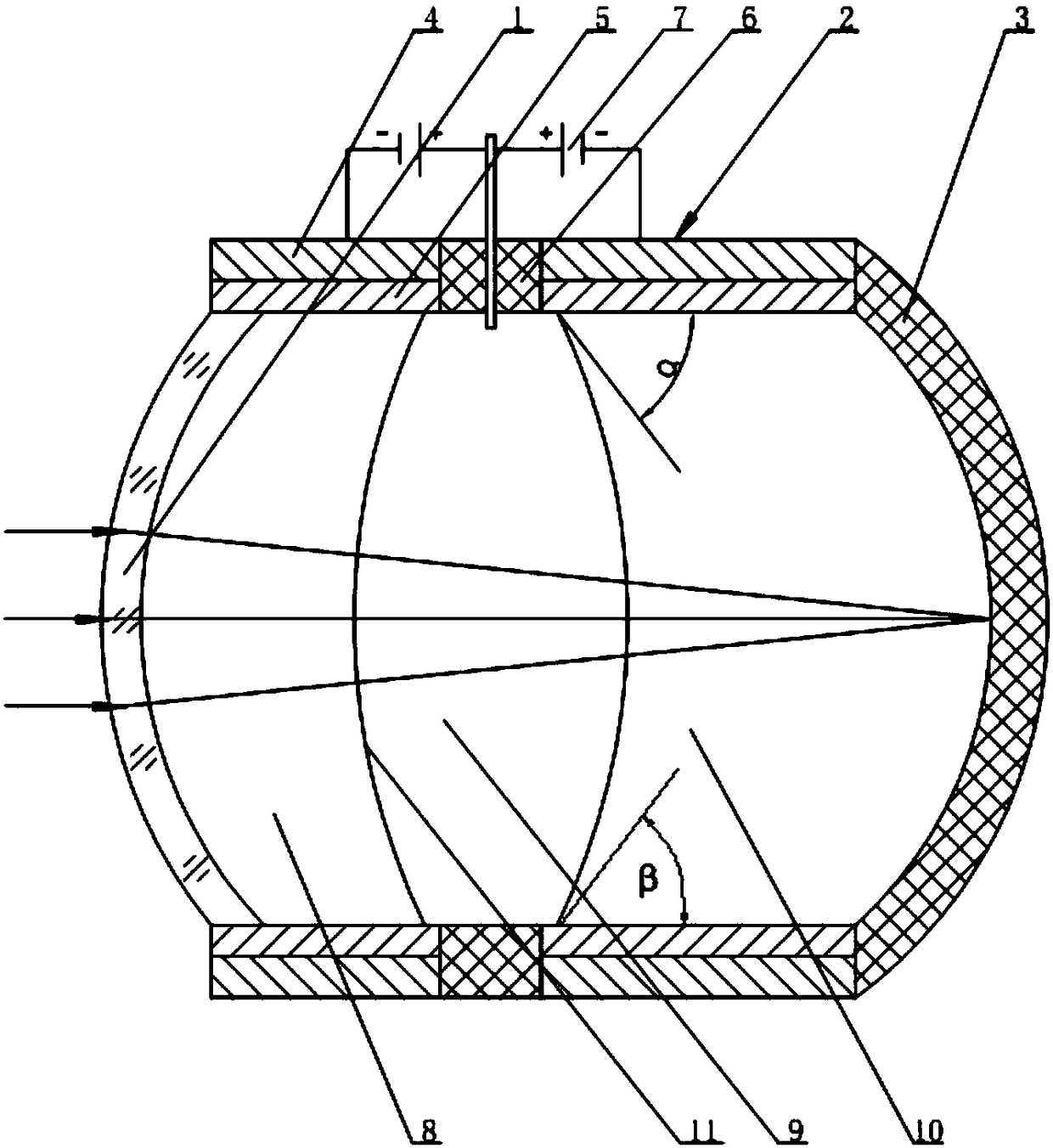a simulated eye
A technology for simulating eyes and shells, which is applied to simulated eyes. It can solve problems such as poor optical axis stability, and achieve the effects of strong light penetration, low power consumption and large adjustment range.
- Summary
- Abstract
- Description
- Claims
- Application Information
AI Technical Summary
Problems solved by technology
Method used
Image
Examples
Embodiment 1
[0025] use as figure 1 In the simulated eye shown, the inner diameter of the cylindrical shell is 7mm, the length is 7.5mm, the radius of curvature of the artificial cornea and the artificial eye fundus is 9.5mm, the thickness of the insulating ring is 1mm, and the side of the insulating ring close to the artificial cornea is at a distance from the artificial eye. The distance between the inner surface of the cornea is 2.5 mm, and the distance between the side of the insulating ring close to the artificial eye fundus and the inner surface of the artificial eye fundus is 3.5 mm. The artificial cornea is made of glass, the insulating ring is made of conventional plastic, and the material of the hydrophobic dielectric layer is parylene. The non-polar liquid is monobromododecane, and the polar liquid is 3% by mass sodium chloride aqueous solution. The interface between the non-polar liquid and the polar liquid is near the edge of the insulating ring. The entire simulated eye is ...
Embodiment 2
[0030] use as figure 1 In the simulated eye shown, the inner diameter of the cylindrical shell is 7mm, the length is 7.5mm, the radius of curvature of the artificial cornea and the artificial eye fundus is 9.5mm, the thickness of the insulating ring is 1mm, and the side of the insulating ring close to the artificial cornea is at a distance from the artificial eye. The distance between the inner surface of the cornea is 2.5 mm, and the distance between the side of the insulating ring close to the artificial eye fundus and the inner surface of the artificial eye fundus is 3.5 mm. The artificial cornea is made of glass, the insulating ring is made of conventional plastic, and the material of the hydrophobic dielectric layer is parylene. The non-polar liquid adopts monobromododecane, and the polar liquid is an aqueous solution containing sodium chloride, ethylenediaminetetraacetic acid and polyethylene glycol 2000, wherein the mass percentage of sodium chloride is 3%, and the The...
Embodiment 3
[0035] use as figure 1 In the simulated eye shown, the inner diameter of the cylindrical shell is 6.5 mm, the length is 7 mm, the radius of curvature of the artificial cornea and the artificial eye fundus is 9 mm, the thickness of the insulating ring is 1 mm, and the distance from the side of the insulating ring close to the artificial cornea to the artificial cornea The distance between the inner surface of the artificial eye fundus and the inner surface of the artificial eye fundus is 3 mm. The artificial cornea is made of glass, the insulating ring is made of conventional plastic, and the material of the hydrophobic dielectric layer is parylene. The non-polar liquid adopts bromododecane, and the polar liquid is an aqueous solution containing magnesium chloride, ethylenediaminetetraacetic acid and polyethylene glycol 2000, wherein the mass percentage of magnesium chloride is 5%, and the ethylenediaminetetraacetic acid The mass percentage content of polyethylene glycol 2000 ...
PUM
 Login to View More
Login to View More Abstract
Description
Claims
Application Information
 Login to View More
Login to View More - R&D
- Intellectual Property
- Life Sciences
- Materials
- Tech Scout
- Unparalleled Data Quality
- Higher Quality Content
- 60% Fewer Hallucinations
Browse by: Latest US Patents, China's latest patents, Technical Efficacy Thesaurus, Application Domain, Technology Topic, Popular Technical Reports.
© 2025 PatSnap. All rights reserved.Legal|Privacy policy|Modern Slavery Act Transparency Statement|Sitemap|About US| Contact US: help@patsnap.com

